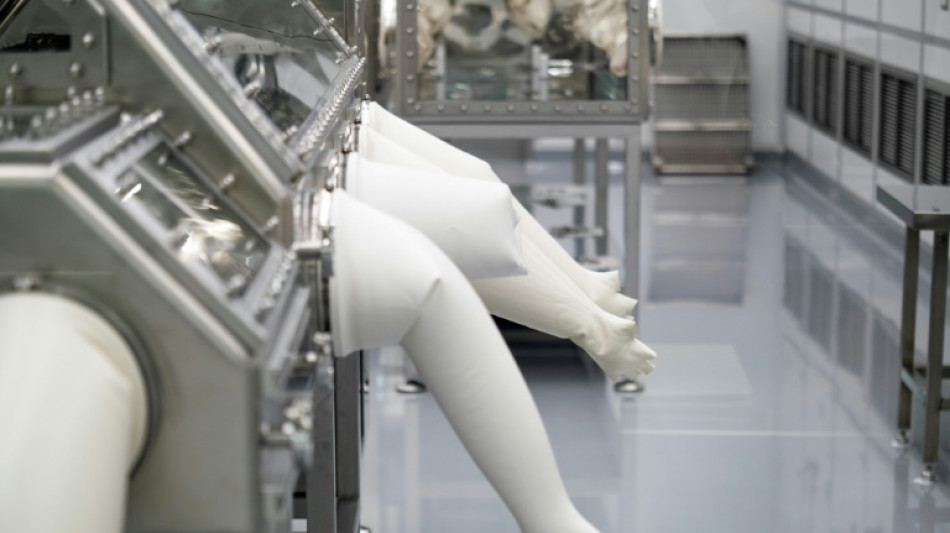
-
 Toothless Liverpool held by Leeds
Toothless Liverpool held by Leeds
-
Dozens killed as fire ravages Swiss ski resort New Year party

-
 K-pop stars BTS to release album in March ahead of world tour
K-pop stars BTS to release album in March ahead of world tour
-
Fresh clashes kill six in Iran cost-of-living protests

-
 Nigeria kicks off new tax regime vowing relief for low earners
Nigeria kicks off new tax regime vowing relief for low earners
-
Dozens killed in fire at Swiss ski resort New Year party

-
 Leftist Mamdani begins first day as New York mayor
Leftist Mamdani begins first day as New York mayor
-
Dozens believed killed in fire at Swiss ski resort New Year party

-
 Brazil Supreme Court rejects Bolsonaro request for house arrest on health concerns
Brazil Supreme Court rejects Bolsonaro request for house arrest on health concerns
-
Israel confirms ban on 37 NGOs in Gaza

-
 Russia blames Ukraine for deadly New Year drone strike
Russia blames Ukraine for deadly New Year drone strike
-
Coach Maresca leaves Chelsea - club

-
 'Several dozen' believed killed in fire at Swiss ski resort New Year party
'Several dozen' believed killed in fire at Swiss ski resort New Year party
-
China's BYD logs record EV sales in 2025

-
 Yemen separatists say Saudi-backed forces to deploy in seized territories
Yemen separatists say Saudi-backed forces to deploy in seized territories
-
Wales rugby star Rees-Zammit signs long-term deal to stay at Bristol

-
 'Several dozen' believed killed in fire at Swiss ski resort New Year bash
'Several dozen' believed killed in fire at Swiss ski resort New Year bash
-
Hakimi, Salah and Osimhen head star-packed AFCON last-16 cast

-
 Israel says it 'will enforce' ban on 37 NGOs in Gaza
Israel says it 'will enforce' ban on 37 NGOs in Gaza
-
Near record number of small boat migrants reach UK in 2025

-
 Several dead as fire ravages bar in Swiss ski resort town Crans Montana: police
Several dead as fire ravages bar in Swiss ski resort town Crans Montana: police
-
Tsitsipas considered quitting tennis during injury-hit 2025

-
 Sabalenka wants 'Battle of the Sexes' rematch and revenge
Sabalenka wants 'Battle of the Sexes' rematch and revenge
-
Osaka drawing inspiration from family at United Cup

-
 Leftist Mamdani takes over as New York mayor under Trump shadow
Leftist Mamdani takes over as New York mayor under Trump shadow
-
Israel's Netanyahu among partygoers at Trump's New Year's Eve fete

-
 Champagnie, Wemby lead Spurs comeback in Knicks thriller
Champagnie, Wemby lead Spurs comeback in Knicks thriller
-
Eight dead in US strikes on alleged drug boats: US military

-
 Trump joins criticism of Clooney's French passport
Trump joins criticism of Clooney's French passport
-
AI, chips boom sent South Korea exports soaring in 2025

-
 Taiwan's president vows to defend sovereignty after China drills
Taiwan's president vows to defend sovereignty after China drills
-
N. Korea's Kim hails 'invincible alliance' with Russia in New Year's letter

-
 In Venezuela, price of US dollar up 479 percent in a year
In Venezuela, price of US dollar up 479 percent in a year
-
Cummins, Hazlewood in spin-heavy Australia squad for T20 World Cup

-
 Ex-boxing champ Joshua discharged from hospital after fatal car crash
Ex-boxing champ Joshua discharged from hospital after fatal car crash
-
Kamenar to Open for Tom Hamilton of Aerosmith's New Band Close Enemies at the World-Famous Whisky a Go Go - January 3, 2026

-
 SUPCASE Unveils Its 2026 Brand Evolution: Lighter in Form, Stronger in Purpose
SUPCASE Unveils Its 2026 Brand Evolution: Lighter in Form, Stronger in Purpose
-
The EPOMAKER RT82: Where Retro Meets Modern Technology

-
 Zelensky says deal to end war '10 percent' away
Zelensky says deal to end war '10 percent' away
-
Trump bashes Clooney after actor becomes French

-
 We are '10 percent' away from peace, Zelensky tells Ukrainians
We are '10 percent' away from peace, Zelensky tells Ukrainians
-
Trump says pulling National Guard from three cities -- for now

-
 Ivory Coast top AFCON group ahead of Cameroon, Algeria win again
Ivory Coast top AFCON group ahead of Cameroon, Algeria win again
-
World welcomes 2026 after a year of Trump, truces and turmoil

-
 Ivory Coast fight back to pip Cameroon for top spot in AFCON group
Ivory Coast fight back to pip Cameroon for top spot in AFCON group
-
Second Patriots player facing assault charge

-
 Trump-hosted Kennedy Center awards gala ratings plummet
Trump-hosted Kennedy Center awards gala ratings plummet
-
Israel begins demolishing 25 buildings in West Bank camp

-
 Cambodian soldiers freed by Thailand receive hero's welcome
Cambodian soldiers freed by Thailand receive hero's welcome
-
Sudan lose to Burkina Faso as Algeria win again at Cup of Nations

| AZN | -0.63% | 91.93 | $ | |
| RIO | -0.61% | 80.03 | $ | |
| RELX | -1.71% | 40.42 | $ | |
| RBGPF | -0.37% | 80.75 | $ | |
| NGG | -0.54% | 77.35 | $ | |
| RYCEF | 0.13% | 15.51 | $ | |
| BTI | 0.12% | 56.62 | $ | |
| VOD | -0.15% | 13.21 | $ | |
| SCS | 0.12% | 16.14 | $ | |
| GSK | -0.53% | 49.04 | $ | |
| CMSC | -0.15% | 22.65 | $ | |
| CMSD | 0.09% | 23.15 | $ | |
| JRI | 0.22% | 13.61 | $ | |
| BCC | -0.26% | 73.6 | $ | |
| BP | -0.06% | 34.73 | $ | |
| BCE | 1.05% | 23.82 | $ |

NASA lab hopes to find life's building blocks in asteroid sample
Eager scientists and a gleaming lab awaits.
A sample from the asteroid Bennu, which could be key to understanding the formation of the solar system and our own planet, is set to be analyzed at NASA's Johnson Space Center in Houston after it reaches Earth in late September.
The precious cargo is currently aboard OSIRIS-REx, a US space probe launched in 2016 to Bennu, which orbits the Sun at an average distance of about 105 million miles (168 million kilometers).
Long white sleeves hang from the huge metal and glass box in which the sample will be handled.
Scientists will separate pieces of the rock and dust for study now, while carefully storing away the rest for future generations equipped with better technology -- a practice first started during the Apollo missions to the Moon.
"We don't expect there to be anything living but (rather) the building blocks of life," Nicole Lunning, lead OSIRIS-Rex sample curator, told AFP.
"That's really what motivated going to this type of asteroid, to understand what the precursors were that may have fostered life in our solar system and on Earth."
Once the return vessel arrives at the Texas "cleanroom," Lunning's job will be to carefully disassemble it and separate the contents, all while keeping the material pure and uncontaminated.
- Origins of life -
The spacecraft is scheduled to land in the Utah desert on September 24, carrying an estimated 8.8 ounces, or 250 grams of material -- just over a cupful.
Obtaining it involved a high-risk operation in October 2020: the probe came into contact with the asteroid for a few seconds, and a blast of compressed nitrogen was emitted to raise the dust sample which was then captured.
The whole mission was imperiled when NASA realized a few days later that the valve of the collection compartment was failing to close, letting fragments escape into space.
But the precious cargo was finally secured after being transferred to a capsule fixed in the spacecraft's center.
The first samples brought to Earth by asteroids were carried out by Japanese probes in 2010 and 2020, with the latter found to contain uracil, one of the building blocks of RNA.
The finding lent weight to a longstanding theory that life on Earth may have been seeded from outer space when asteroids crashed into our planet carrying fundamental elements.
Cosmochemist Eve Berger can't wait to get to work on the Bennu material.
"These samples haven't hit the Earth. They haven't been exposed to our atmosphere. They haven't been exposed to really anything except harsh space for billions of years," she said.
Ultimately they "will help us to determine whether what we really think is true, is true," said Berger.
Not only might the Bennu sample add to our knowledge of the ingredients that brought life to our world, but "if we can figure out what happened here on the Earth, that helps us to extrapolate to other bodies where we might look or how we might interpret what we're seeing," she added.
Could Bennu bring back something that's never been seen before? "You never know," said Berger.
"Bennu is a trickster, so we'll know more in a few months when the sample comes back -- that would be exciting!"
C.Garcia--AMWN

